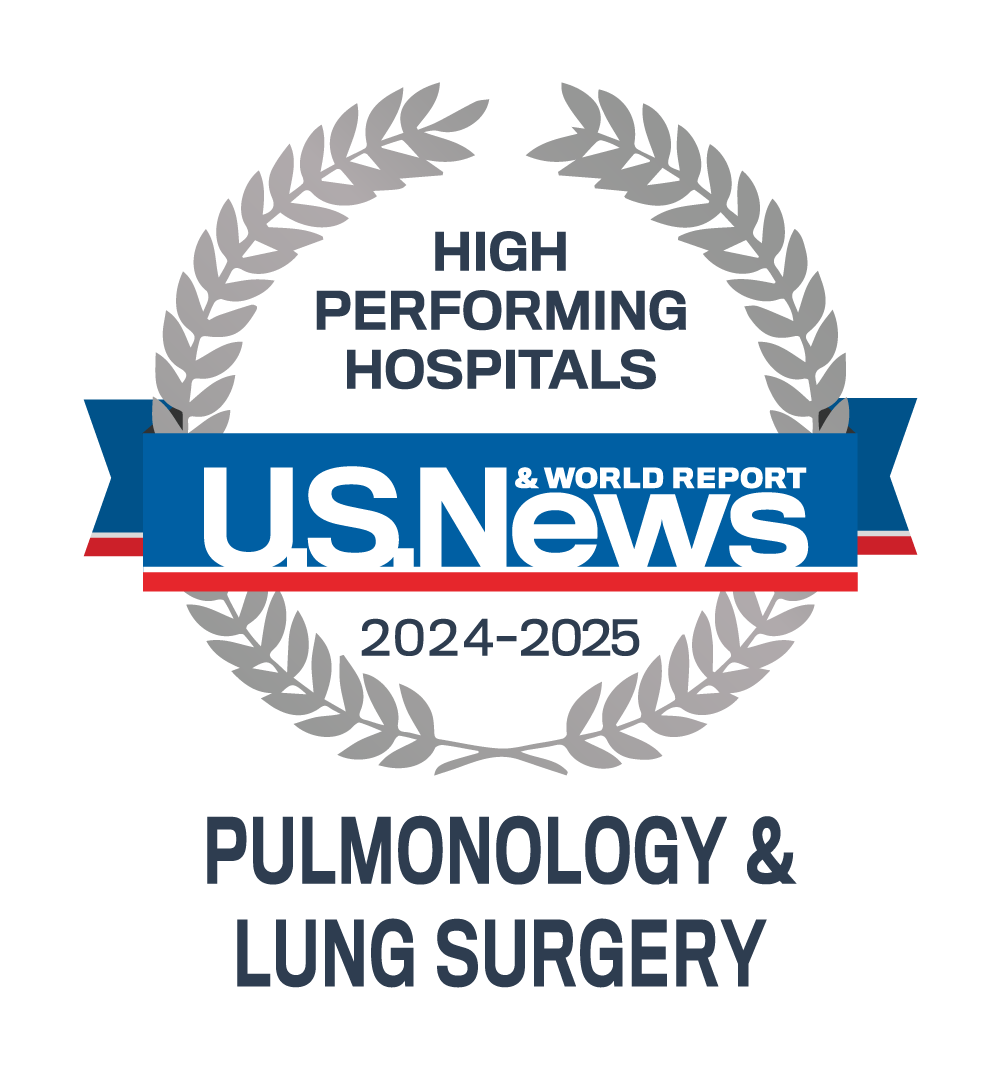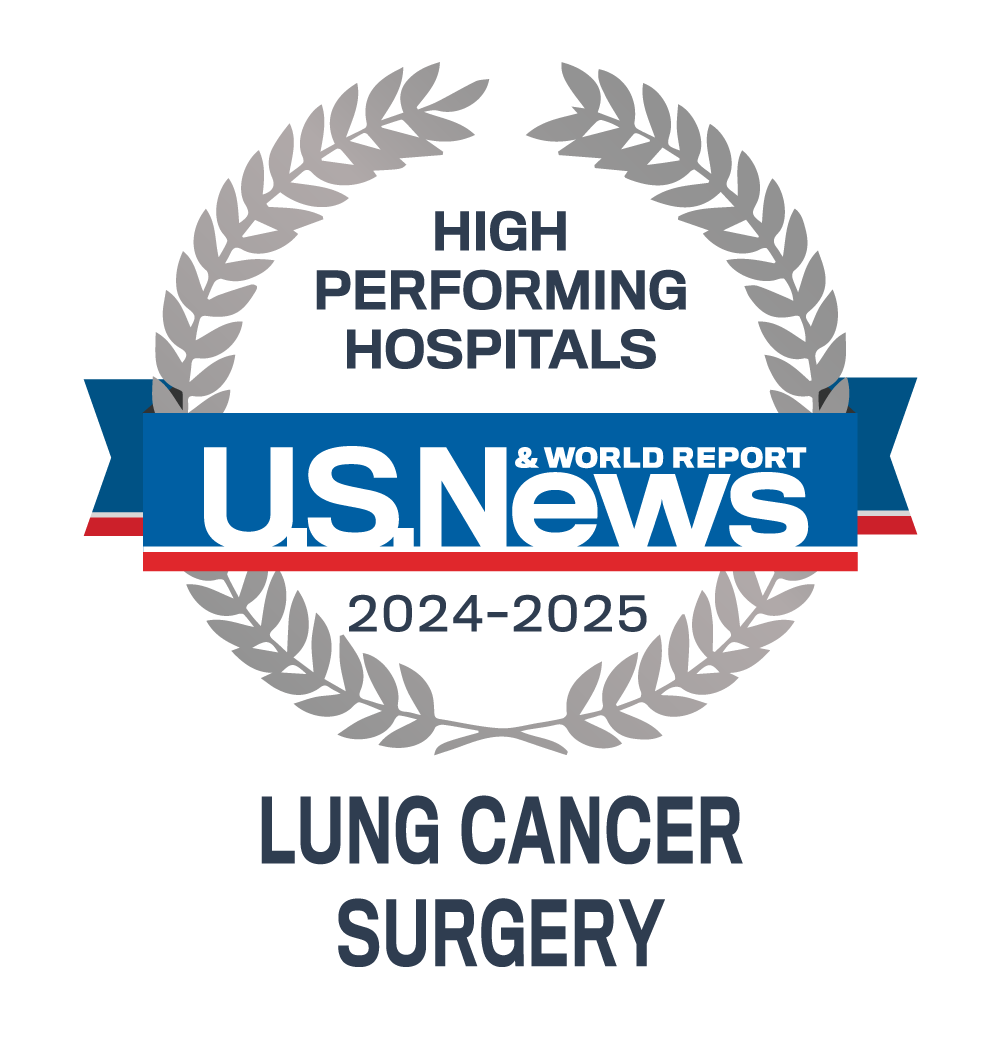Lung Cancer at UK Markey Cancer Center

 Using state-of-the-art technology and leading-edge medical and surgical interventions, Markey’s lung cancer team provides advanced and timely diagnosis and individualized, ongoing care for patients. Each patient is cared for by a team of specialists who meet regularly to discuss individual patient cases and treatment plans. This multidisciplinary team will work with you and your doctor to coordinate a care plan designed to offer the best outcomes.
Using state-of-the-art technology and leading-edge medical and surgical interventions, Markey’s lung cancer team provides advanced and timely diagnosis and individualized, ongoing care for patients. Each patient is cared for by a team of specialists who meet regularly to discuss individual patient cases and treatment plans. This multidisciplinary team will work with you and your doctor to coordinate a care plan designed to offer the best outcomes.
Conditions commonly treated include small cell lung cancer and non-small cell lung cancer, mesothelioma, thymic tumors and other thoracic cancers including esophageal cancer and tumors of the mediastinum. Thoracic surgery, interventional pulmonary medicine, radiation, chemotherapy and precision medicine treatments are state-of-the-art, supplemented by national research studies as well as treatments with promising new drug regimens.
Markey has provided state-of-the-art cancer care for more than 30 years, and we are proud to be the only cancer center in Kentucky designated by the National Cancer Institute. Since 2017, Markey Cancer Center has been nationally recognized as a top 50 cancer center by U.S. News & World Report.
Many people don’t have lung cancer symptoms until the later stages of the disease, when it spreads to other parts of the body.
When we catch lung cancer early, it’s easier to effectively treat the cancer. We recommend lung cancer screening for anyone at high risk for the disease. Screening helps us find and treat cancers before symptoms start.
If you do experience lung cancer symptoms, they may include:
- Chest pain
- Constant coughing and wheezing coughs
- Coughing up blood
- Repeated pneumonia
- Shortness of breath
- Swollen lymph nodes
- Tiredness
- Unexplained weight loss
According to the American Cancer Society, the five-year survival rate for lung cancer that has not spread to other parts of the body is 63 percent. When it has begun to spread to nearby regions, the survival rate drops to 35 percent. When lung cancer spreads throughout the body, the survival rate is 7 percent.
You can lower your risk of cancer by taking steps to build a healthy lifestyle. Here are some ways you can lower your risk for this disease, as well as improve your overall basic health:
- Stop smoking and using other tobacco products. Tobacco has been tied to multiple cancers, and it is responsible for 90 percent of lung cancer deaths. The Markey CARES Tobacco Treatment Program can help you quit smoking. CARES services include counseling, medication and other support.
- Get your home tested for radon. Radon is a clear, odorless gas that can cause cancer if it’s breathed in too much. Radon comes from rocks, soil and water and gets into homes through small cracks and holes. Lung cancer from radon is preventable, and free testing kits are available from the Kentucky Radon Program.
- Stay physically active. Your physical activity is related to risk for colon and breast cancer. Excess weight gained from inactivity increases the risk of multiple cancers.
- Limit alcohol consumption. It is important to be mindful of how much alcohol you drink. Alcohol intake, even in moderate amounts, can increase the risk for colon, breast, esophageal and oropharyngeal cancer.
- Learn about screenings. Your primary care doctor can recommend appropriate cancer screenings based on your age, personal risk and family history.
The two main risk factors for lung cancer are smoking and exposure to secondhand smoke. Cigarette smoking is related to as many as 90 percent of lung cancer deaths. People who smoke are 15 to 30 times more likely to contract lung cancer than non-smokers. Secondhand smoke can also cause lung cancer.
Other risk factors include:
- Diet. Smokers who take beta-carotene supplements are at higher risk, as are people who have arsenic in their drinking water, usually from private wells.
- Personal or family history. Lung cancer survivors, especially smokers, are at risk of another lung cancer. Your risk is also higher if a close relative had lung cancer.
- Radiation therapy. Cancer survivors who underwent radiation therapy are at higher risk for lung cancer.
- Radon. A natural gas in rocks and dirt that can become trapped in your home or workplace. An estimated 1 in 15 American homes have high levels of radon.
- Workplace chemicals. Asbestos, arsenic, diesel fumes, silica and chromium in the workplace can increase lung cancer risk.
- For your first visit, you will be directed to the Head, Neck and Respiratory Clinic on the second floor of the Ben Roach Building. Directions to the Ben Roach Building.
- You can register at the front desk or registration area, where a Markey team member will help guide you through your appointment.
- Several parking options are available to patients of Markey Cancer Center.
- Please remember to bring your patient packet with the completed forms. These items will help your doctor learn more about your case and determine the best plan for your care.
- To meet our patient needs, UK HealthCare accepts many forms of insurance.
Clinical trials are research studies aimed at evaluating medical, surgical or behavioral interventions to determine if a new treatment is safe and effective.
At UK Markey Cancer Center, we have several clinical trials and research studies open at any one time. In fact, through our Research Network, we offer patients access to clinical trials in multiple locations in Kentucky and West Virginia, serving the people of Kentucky and Appalachia close to home
Markey has more open clinical trials than any other cancer center in the region, giving you access to some of the most advanced options available.


























